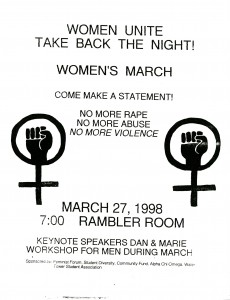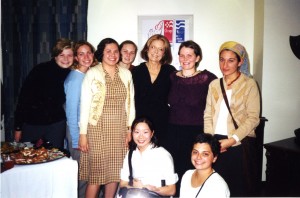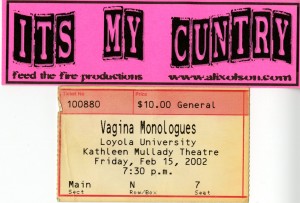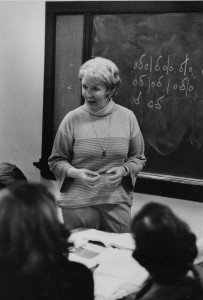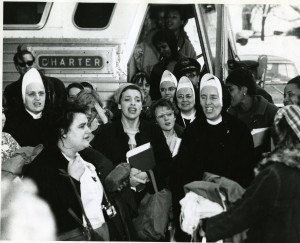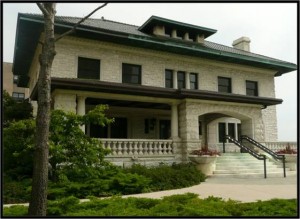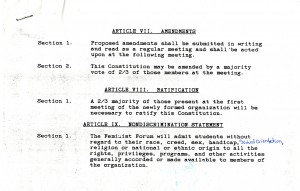
The values of the Feminist Forum are clearly laid out in its original constitution. One of the most important of which was a commitment to nondiscrimination.
The Feminist Forum is a student organization at Loyola University Chicago which seeks to provide students with a supportive, safe, and open environment to discuss feminist issues. Founded in 1995 through the Women’s Studies and Gender Studies Program, the first meeting was held on September 19, 1995 on the Lakeshore campus. Phoebe Stein, a graduate student, served as leader for the night, and over 20 undergraduate students attended. A pro-active organization, the Feminist Forum sought to bring speakers and hold events to raise awareness of the challenges in many women’s lives such as sexual violence, HIV and AIDS, discrimination, sexual harassment and awareness of systems of patriarchy.
In September, the Feminist Forum will celebrate its twentieth anniversary; in these years of existence, the Feminist Forum has facilitated memorable events that highlight the dedication of the Loyola students and faculty who adamantly believe in gender equality. The Take Back the Night (also known as Reclaim the Night) March became an important tradition that the Feminist Forum coordinated on Loyola’s campus. First held in Belgium in 1976, this internationally held march is intended as a protest against rape and other forms of sexual violence.
In 2000, the Feminist Forum coordinated with several other student organizations to organize ten days of events for Take Back the Night, culminating with the march, to increase awareness of sexual assault and rape on campus. The hope was to improve the services for victims of sexual assault provided by the University.
Gloria Steinem, the famed leader of the women’s liberation movement of the 1960s and 70s, was invited by the Feminist Forum to speak at Loyola in 1999. Steinem’s talk, however, proved to be a hot-button issue on campus. An article in the Loyola Phoenix reported that “approximately 15 Loyola students and members of the Pro-Life Action League protested Steinem’s speech” by holding placards showing graphic pictures of aborted fetuses.
In 2002, the Feminist Forum facilitated a production of the Vagina Monologues at Loyola. The purpose of the monologues, which have been widely performed since debuting in 1996, is to focus on the feminine experience with topics such as sex, menstruation, rape, and genital mutilation discussed.
The Feminist Forum Records at the Women and Leadership Archives consists of 0.25 linear feet of material and document the organization from 1995-2002. Related collections at the Women and Leadership Archives include the Women’s Studies Program Records which documents the Women’s Studies Program at Loyola University Chicago from 1977-2009.
Original research for this post was done by WLA intern Sebastian during the Fall of 2012.
Loyola University Chicago’s Women and Leadership Archives Blog is designed to provide a positive environment for the Loyola community to discuss important issues and ideas. Differences of opinion are encouraged. We invite comments in response to posts and ask that you write in a civil and respectful manner. All comments will be screened for tone and content and must include the first and last name of the author and a valid email address. The appearance of comments on the blog does not imply the University’s endorsement or acceptance of views expressed.

